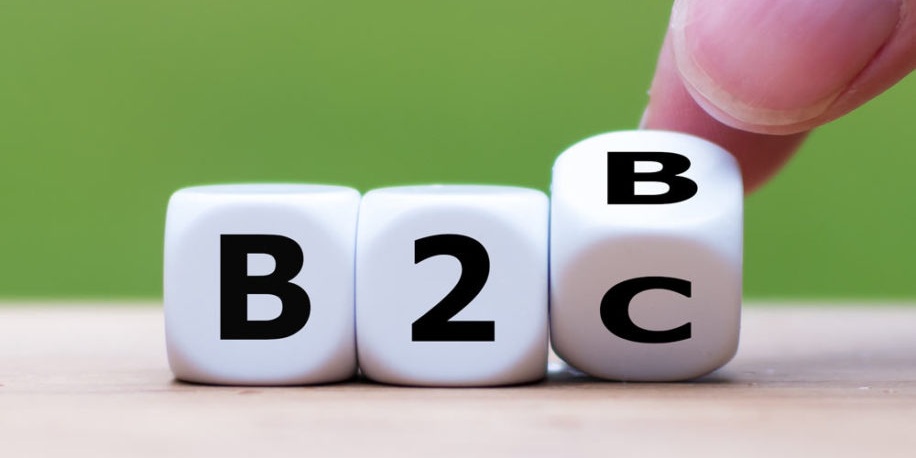B2B and B2C companies sell their products and services to different audiences, which requires different marketing and sales approaches.
Although B2B and B2C involve a customer buying something from a company, there are some key differences between the two approaches.
B2B and B2C are two acronyms that are used regularly.
B2B stands for “business to business”, referring to the type of transaction that occurs between one business and another.
B2C stands for "business-to-consumer", which is a transaction that occurs between a business and an individual as the end consumer.
While B2B and B2C essentially follow the same equation—a customer buying something from a company—there are some key differences in in these two approaches.
The path to purchase
The “customer journey” or “path to purchase” — for example, the series of decisions a company or customer makes before completing a transaction—looks different for B2B and B2C businesses.
Understanding what a customer needs before they can purchase from your brand is fundamental to your sales, marketing and customer service planning.
In the B2B market, businesses target other companies. For example, companies that sell software to other businesses whose employees use them as tools to do their daily work. Every purchasing decision involves multiple stakeholders, often involving finance, accounting, company management, purchasing and other teams.
Typically, the B2B process involves the following steps, with consensus being reached along the way:
- Identify a problem or need.
- Explore different solutions and do market research.
- Create a list of requirements.
- Select a supplier (e.g., B2B business).
In the B2C market, a business sells products only directly to an individual. This means that the path to purchase can be relatively linear: they look at a specific set of products or services, shop around, evaluate options, and make a decision.
However, recently the dynamics of B2B customer interactions have changed and become more similar to B2C. Reviews often indicate that more than 70% of B2B marketing teams plan to invest in influencer marketing this year.
The purchase decision
Companies consider different factors when making purchasing decisions than individual customers. They care about price, efficiency, productivity, and ROI.
B2C customers have more opportunities to make an emotional connection. Brands like Nike, Whole Foods, and Petco must address each customer's desires by crafting an entertaining and educational story into their marketing and sales campaigns.
“B2C customers are investing heavily in their own enjoyment, buying for themselves rather than for the business they work for. Sure, everyone wants products that make their lives easier, but the average B2C audience is much more interested in entertainment than the average B2B audience,” writes HubSpot.
While B2B marketing and sales focus primarily on building trust, authority, and price leadership, B2C marketing aims to be memorable.
Attracting clients
B2B and B2C differ in how they generate leads, although this difference has narrowed in recent years.
B2B companies have historically relied on traditional methods of interaction: sales calls, conferences, exhibitions and networking. “If you're planning on selling B2B, make sure you're willing to take the time to develop a relationship with your prospect,” Forbes wirites. “For example, you may need to formally present your proposal or make several phone calls to more than one person in the company.”
However, recently the dynamics of B2B customer interactions have changed and become more similar to B2C. More than 70% of B2B marketing teams plan to invest in influencer marketing this year. Social media is an increasingly effective marketing tool for B2B companies, with 75% of B2B buyers and 84% of senior executives saying they use social media when making purchases.
Customer service
Finally, B2C and B2B require different approaches to customer service.
Today's consumers value an independent, self-service approach to customer service. In the B2C space, people want to be able to quickly and efficiently resolve a problem, ask a question, or connect with a live agent without having to navigate through a long phone menu or navigate dozens of web pages. The essence of B2C companies is to: help customers help themselves.
In B2B, some self-service capabilities are certainly welcome. However, B2B transactions are typically complex, expensive, and time-consuming. As a result, B2B businesses often require a dedicated support team to resolve their customers' problems.
This arrangement helps alleviate the frustration and stress that comes with having multiple teams use the same account. It can also promote continuity, for example by managing all requests in one CRM dashboard. Design your customer service to be thorough and consistent, no matter who asks for help.
Our services:
-
Accept Online payments on website
-
Service e-Cont.md – electronic invoices for payment
-
Ecommerce Web Analytics
-
Search Engine Optimization
-
Ecommerce SEO Services
-
Dynamic Remarketing
-
Internet Marketing Strategy
Source:
Diginet.md: The EU has introduced a law on digital markets




